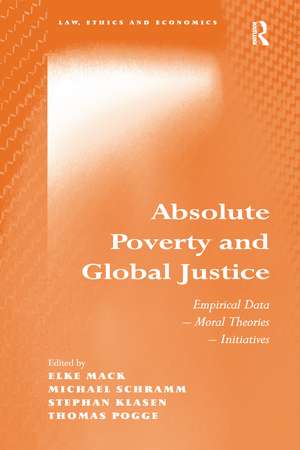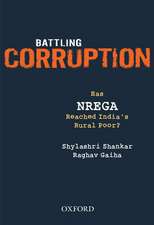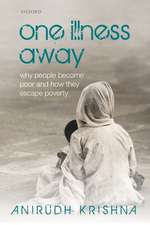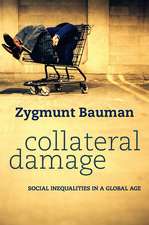Absolute Poverty and Global Justice: Empirical Data - Moral Theories - Initiatives: Law, Ethics and Economics
Autor Michael Schramm Editat de Elke Mack Autor Thomas Poggeen Limba Engleză Paperback – 26 oct 2016
| Toate formatele și edițiile | Preț | Express |
|---|---|---|
| Paperback (1) | 338.33 lei 6-8 săpt. | |
| Taylor & Francis – 26 oct 2016 | 338.33 lei 6-8 săpt. | |
| Hardback (1) | 824.70 lei 6-8 săpt. | |
| Taylor & Francis – 28 sep 2009 | 824.70 lei 6-8 săpt. |
Preț: 338.33 lei
Preț vechi: 394.32 lei
-14% Nou
Puncte Express: 507
Preț estimativ în valută:
64.74€ • 67.60$ • 53.46£
64.74€ • 67.60$ • 53.46£
Carte tipărită la comandă
Livrare economică 15-29 aprilie
Preluare comenzi: 021 569.72.76
Specificații
ISBN-13: 9781138255050
ISBN-10: 113825505X
Pagini: 302
Dimensiuni: 156 x 234 mm
Greutate: 0.45 kg
Ediția:1
Editura: Taylor & Francis
Colecția Routledge
Seria Law, Ethics and Economics
Locul publicării:Oxford, United Kingdom
ISBN-10: 113825505X
Pagini: 302
Dimensiuni: 156 x 234 mm
Greutate: 0.45 kg
Ediția:1
Editura: Taylor & Francis
Colecția Routledge
Seria Law, Ethics and Economics
Locul publicării:Oxford, United Kingdom
Cuprins
Contents: The Erfurt Manifesto. Common stance of all contributors; Commentary on the Erfurt manifesto. Introduction: justice for the poor - a global paradigm in progress and dispute, Elke Mack. Part 1 Poverty Data Under Scrutiny: Levels and trends in absolute poverty in the world: what we know and what we don't, Stephan Klasen; Identifying absolute global poverty in 2005: the measurement question, Michael Ward; How world poverty is measured and tracked, Thomas Pogge. Part 2 Christian Ethics on Justice and the Poor: Christian ethics and the challenge of absolute poverty, Clemens Sedmak; 'De iustitia in mundo' - global justice in the tradition of the social teaching of the Catholic church, Gerhard Kruip; Religions and global justice: reflections from an inter-cultural and inter-religious perspective, Johannes Müller and Michael Reder. Part 3 Global Theories of Justice and Responsibility: On the concept of global justice, Peter Koller; Poverty and responsibility, Stefan Gosepath; Absolute poverty and global inequality, Darrel Moellendorf; Sufficientarianism: both international and intergenerational?, Lukas Meyer; The alleged dichotomy between positive and negative rights and duties, Elizabeth Ashford; Complicity in harmful action: contributing to world poverty and duties of care, Barbara Bleisch; Transnational political elites and their duties of the common good, Eike Bohlken; World poverty and moral free-riding: the obligations of those who profit from global injustice, Norbert Anwander. Part 4 Policies and Actions: Medicines for the world: boosting innovation without obstructing free access, Thomas Pogge; Not only ' a simple math equation': business organisations as agents for poverty reduction, Michael Schramm and Judit Seid; The role of corporate citizens in fighting poverty: an ordonomic approach to global justice, Ingo Pies and Stefan Hielscher; Global justice in the context of worldwide poverty and climate change, Johannes Wallacher. Conclusion: the paradox
Notă biografică
Elke Mack is Professor of Christian Social Science at the Department of Christian Social Ethics, University of Erfurt, Germany. Michael Schramm is Professor at the Department of Catholic Theology and Business Ethics, University of Stuttgart-Hohenheim, Germany. Stephan Klasen is Professor at the Department of Development Economics, University of Göttingen, Germany. Thomas Pogge is a German philosopher, currently Leitner Professor of Philosophy and International Affairs at Yale University, Professorial Fellow at the Centre for Applied Philosophy and Public Ethics at the Australian National University, Research Director in the Centre for the Study of Mind in Nature at the University of Oslo, and Adjunct Professor in the Centre for Professional Ethics at the University of Central Lancashire
Recenzii
'It is essential that theories of global justice are grounded in an adequate and critical assessment of global reality. This does not just refer to the reality of grave poverty and material inequality, but first and foremost to an account of social and economic relations that cause or support the status quo. This volume is exemplary in bringing normative and empirical perspectives together in order to ask what can and should be done for the sake of justice - and by whom.' Rainer Forst, Goethe-University Frankfurt am Main, Germany
Descriere
It is held that absolute poverty causes approximately one third of all human deaths, some 18 million annually, and blights billions of lives with hunger and disease. This book develops universalizable norms aimed at tackling absolute poverty and the complex and multilayered problems associated with it.


















